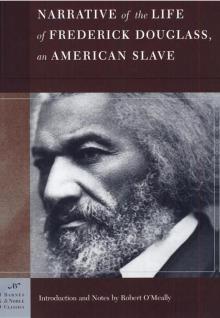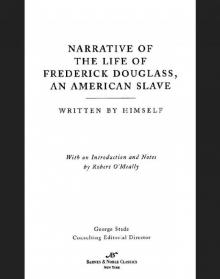- Home
- Frederick Douglass
The Negro Exodus from the Gulf States
The Negro Exodus from the Gulf States Read online
THE NEGRO EXODUS FROM
THE GULF STATES.
BY FREDERICK DOUGLAS.
THE negro, long deemed too indolent and stupid to discover and adopt any rational measure to secure and defend his rights as a man, may now be congratulated upon the telling contradiction which he has recently and strikingly given to this withering disparagement and reproach. He has discovered and adopted a measure which may assist very materially in the solution of some of the vital problems involved in his sudden elevation from slavery to freedom. He has shown that Mississippi can originate more than one plan, and that there is a possible plan for the oppressed as well as for the oppressor. He has not chosen to copy the example of his would-be enslavers. It is to his credit that he has steadily refused to resort to those extreme measures of repression and retaliation to which the cruel wrongs he has suffered might have tempted a less docile and forgiving race. He has not imitated the plan of the oppressed tenant, who sneaks in ambush and shoots his landlord, as in Ireland; nor the example of the Indian, who meets the invader of his hunting-ground with scalping-knife and tomahawk; he has not learned his lesson from the freed serfs of Russia, and organized assassination against tyrant princes and nobles; nor has he copied the example of his own race in Santa Domingo, who taught their French oppressors by fire and sword the danger of goading too far "the energy that slumbers in the black man's arm." On the contrary, he has adopted a simple, lawful and peaceable measure. It is emigration--the quiet withdrawal of his valuable bones and muscles from a condition of things which he considers no longer tolerable. Innocent as this remedy is for the manifold ills which he has thus far borne with marvelous patience, it is none the less significant and effective.
Nothing has occurred since the abolition of slavery which has excited a deeper interest among thoughtful men in all sections of the country than has this "exodus." In the simple fact that a few thousand freedmen have deliberately laid down the shovel and the hoe, quitted the sugar and cotton-fields of Mississippi and Louisiana, and sought homes in Kansas, and that thousands more are seriously meditating upon following their example, the sober thinking minds of the South have discovered a new and startling peril to the welfare of that section of our country. Already apprehension and alarm have led to noisy and frantic efforts on the part of the South to arrest and put an end to what it considers a depleting and ruinous evil.
It cannot be denied that there is much reason for this apprehension and alarm. This exodus has revealed to Southern men the humiliating fact that the prosperity and civilization of the South are at the mercy of the despised and hated negro--that it is for him more than for any other to say what shall be the future of the late Confederate States; that within their ample borders he alone can stand between the contending powers of savage and civilized life; that the giving or withholding of his labor will bless or blast their beautiful country.
Important as manual labor is everywhere, it is nowhere more important and absolutely indispensable to the existence of society than in the more southern of the United States. Machinery may continue to do--as it has done--much of the work of the North; but the work of the South requires bone, sinew and muscle of the strongest and most enduring kind for its performance. Labor in that section must know no pause. Her soil is pregnant and prolific with life and energy. All the forces of nature within her borders are wonderfully vigorous, persistent and active. Aided by an almost perpetual Summer, abundantly supplied with heat and moisture, her soil readily and rapidly covers itself with noxious weeds, dense forests and impenetrable jungles. Only a few years of non-tillage would be required to give the sunny and fruitful South to the bats and owls of a desolate wilderness. From this condition, shocking for a Southern man to contemplate, it is now seen that nothing less powerful than the naked iron arm of the negro can save her. For him, as a Southern laborer, there is no competitor or substitute. The thought of filling his place by any other variety of the human family, will be found delusive and utterly impracticable. Neither Chinaman, German, Norwegian nor Swede can drive him from the sugar and cotton-fields of Louisiana and Mississippi. They would certainly perish in the black bottoms of these States if they could be induced, which they cannot, to try the experiment.
Nature itself, in those States, comes to the rescue of the negro, fights his battles and enables him to exact conditions from those who would unfairly treat and oppress him. Besides being dependent upon the roughest and flintiest kind of labor, the climate of the South makes such labor uninviting and harshly repulsive to the white man. He dreads it, shrinks from it, and refuses it. He shuns the burning sun of the fields, and seeks the shade of the verandas. On the contrary, the negro walks, labors and sleeps in the sunlight unharmed. The standing apology for slavery was based upon a knowledge of this fact. It was said that the world must have cotton and sugar, and that only the negro could supply this want; and that he could be induced to do it only under the "beneficent whip" of some bloodthirsty Legree. The last part of this argument has been happily disproved by the large crops of these productions since Emancipation; but the first part of it stands firm, unassailed and unassailable.
Even if climatic and other natural causes did not protect the negro from all competition in the labor-market of the South, inevitable social causes would probably effect the same result. The slave system of that section has left behind it--as in the nature of the case it must--manners, customs and conditions to which free white laboring men will be in no haste to submit themselves and their families. They do not emigrate from the free North, where labor is respected, to a lately enslaved South, where labor has been whipped, chained and degraded for centuries. Naturally enough, such emigration follows the lines of latitude in which they who compose it were born. Not from South to North, but from East to West, "the Star of Empire takes its way."
Hence it is seen that the dependence of the planters, landowners and old master-class of the South upon the negro, however galling and humiliating to Southern pride and power, is nearly complete and perfect. There is only one mode of escape for them, and that mode they will certainly not adopt. It is to take off their own coats, cease to whittle sticks and talk politics at the cross-roads, and go themselves to work in their broad and sunny fields of cotton and sugar. An invitation to do this is about as harsh and distasteful to all their inclinations as would be an invitation to step down into their graves. With the negro, all this is different. Neither natural, artificial nor traditional causes stand in the way of the freedman to such labor in the South. Neither the heat nor the fever-demon which lurks in her tangled and cozy swamps affright him, and he stands to-day the admitted author of whatever of prosperity, beauty and civilization are now possessed by the South, and the admitted arbiter of her destiny.
This, then, is the high vantage-ground of the negro: he has labor, the South wants it, and must have it or perish. Since he is free he can now give it or withhold it, use it where he is, or take it elsewhere, as he pleases. His labor made him a slave, and his labor can, if he will, make him free, comfortable and independent. It is more to him than fire, swords, ballot-boxes or bayonets. It touches the heart of the South through its pocket. This power served him well years ago, when in the bitterest extremity of his destitution. But for it he would have perished when he dropped out of slavery. It saved him then, and it will
save him again. Emancipation came to him, surrounded by exceedingly unfriendly circumstances. It was not the choice or consent of the people among whom he lived, but against their will and a death-struggle on their part to prevent it. His chains were broken in the tempest and whirlwind of civil war. Without food, without shelter, without land, without money, and without friends, he, wi
th his children, his sick, his aged and helpless ones, were turned loose and naked to the open sky. The announcement of his freedom was instantly followed by an order from his master to quit his old quarters and to seek bread thereafter from the hands of those who had given him his freedom. A desperate extremity was thus forced upon him at the outset of his freedom, and the world watched, with humane anxiety, to see what would become of him. His peril was imminent. Starvation and death stared him in the face, and marked him for their victim.
It will not be soon forgotten that, at the close of a five-hours' speech by the late Senator Sumner, in which he advocated with unequaled learning and eloquence the enfranchisement of the freedmen, the best argument with which he was met, in the Senate, was that legislation at that point would be utterly superfluous; that the negro was rapidly dying out, and must inevitably and speedily disappear and become extinct.
Inhuman and shocking as was this consignment of millions of human beings to extinction, the extremity of the negro, at that date, did not contradict, but favored, the prophecy. The policy of the old master class, dictated by passion, pride and revenge, was then to make the freedom of the negro a greater calamity to him, if possible, than had been his slavery. But, happily, both for the old master class and for the recently emancipated, there came then, as there will come now, the sober second thought. The old master class then found that it had made a great mistake. It had driven away the means of its own support. It had destroyed the hands and left the mouths. It had starved the negro, and starved itself. Not even to gratify its own anger and resentment could it afford to allow its fields to go uncultivated, and its tables to go unsupplied with food. Hence the freedman, less from humanity than cupidity, less from choice than necessity, was speedily called back to labor and life.
But now, after fourteen years of service, and fourteen years of separation from the visible presence of slavery, during which he has shown both disposition and ability to supply the labor-market of the South, and that he could do so far better as a freedman than he ever did as a slave; that more cotton and sugar can be raised by the same hands, under the inspiration of liberty and hope, than can be raised under the influence of bondage and the whip, he is again, alas! in the deepest trouble--again without a home, out under the open sky, with his wife and his little ones. He lines the sunny banks of the Mississippi, fluttering in rags and wretchedness, mournfully imploring hard-hearted steamboat captains to take him on board; while the friends of the emigration movement are diligently soliciting funds all over the North to help him away from his old home to the new Canaan of Kansas.
Several causes have been assigned for this truly desperate and pitiable spectacle. Many of these are, upon their faces, superficial, insufficient and ridiculous. Adepts in political trickery and duplicity, who will never go straight to a point when they can go crooked, explain the exodus as a cunning scheme to force a certain nomination upon the Republican party in 1890. It does not appear how such an effect is to follow such a cause. For if the negroes are to leave the South, as the advocates of exodus tell us, and settle in the North, where all their rights are protected--if this is the remedy for all the ills of the negro, the country need not trouble itself about securing a President whose chief recommendation is supposed to be his will and power to protect the negro in the South, and the nomination is thus rendered unnecessary by the success of the measure which made it necessary.
Again, we are told that greedy speculators in Kansas have adopted this plan to sell and increase the value of their lands. This cannot be true. Men of that class are usually shrewd. They do not seek to sell land to those who have no money, and they are too sharp to believe that they can increase the value of their property by inviting to its neighborhood a class of people against whom there is an intense and bitter popular prejudice. So far from speculating in the negro, and attempting to increase their wealth by promoting this stampede, the negro has been a heavy charge upon Kansas. Her benevolence and welcome to these homeless emigrants has been large, beautiful and touching.
Malignant emissaries from the North, it is said, have been circulating among the freedmen, talking to them and deluding them with promises of the great things which will be done for them if they will only go to Kansas. Plainly enough this theory fails for the want of even the show of probable motive. The North can have no motive to cripple industry at the South, or elsewhere in this country. If she were malignant enough, which she is not, she is not blind enough to her own interests to do any such thing. She sees and feels that an injury to any part of this country is an injury to the whole of it.
Again, it is said that this exodus is all the work of the defeated and disappointed demagogues, white and black, who have been hurled from place and power by the men of property and intelligence in the South. There may be some truth in this theory. Human nature is capable of resentment. It would not be strange if people who have been degraded and driven from place and power by brute force and by fraud, were to resent the outrage in this and in any way open to them.
But it is still further said that the exodus is peculiarly the work of Senator Windom. His resolution and speech in the Senate last Winter, it is said, has set this black ball in motion, and much wrath has been poured out upon that able and humane gentleman for his part in the movement. It need not be denied that there is truth in this allegation. Senator Windom's speech and resolution certainly did serve as a powerful stimulus to this emigration. Until he spoke, there was no general stampede from the cotton and sugar plantations of Mississippi and Louisiana. There can be no doubt, either, that the freedmen received erroneous notions, from some quarter, of what the Government was likely to do for them in the new country to which they were now going. They may have been told the story of "forty acres and a mule," and some of them may have believed and acted upon that story. But it is manifest that the real cause of this extraordinary exodus lies deeper down than any point touched by any of the causes thus far alleged. Political tricksters, land speculators, defeated office-seekers, Northern malignants, speeches and resolutions in the Senate or elsewhere, unaided by other causes, could not have, of themselves, set such a multitudinous exodus in motion.
The colored race is a remarkably home-loving race. It has done little in the way of voluntary colonization. It shrinks from the untried and unknown. It thinks its own locality the best in the world. Of all the galling conditions to which the negro was subjected in the days of his bondage, the one most galling to him was the liability of separation from home and friends. His love of home and his dread of change made him even partially content in slavery. He could endure the smart of the lash, could work to the utmost of his power, and be content, till the thought of being sent away from the scenes of his childhood and youth was thrust upon his heart. This was ever too much for him.
But argument is less needed upon this point than testimony. We have the story of the emigrants themselves, and if any can reveal the true cause of this exodus, they can. They have spoken, and their story is before the country. It is a sad story, disgraceful and scandalous to our age and country. Much of their testimony has been given under the solemnity of an oath.
They tell us, with great unanimity, that they are very badly treated at the South. The landowners, planters, and the old master class generally, deal unfairly with them; that having had their labor for nothing when they were slaves, these men now endeavor, by various devices, to get it for next to nothing; that, work as hard, faithfully and constantly as they may, live as plainly and as sparingly as they may, they are no better off at the end of the year than at the beginning; that they are the dupes and victims of cunning and fraud, in signing contracts which they cannot read and cannot fully understand; that they are compelled to trade at stores owned in whole or in part by their employers, and that they are paid with orders, and not with money.
They say they have to pay double the value of nearly everything they buy; that they are compelled to pay a rental of ten dollars a year for an acre of ground that will
not bring thirty dollars under the hammer; that land-owners are in league to prevent land-owning by negroes; that when they work the land on shares, they barely make a living; that outside the towns and cities no provision is made for their education; and, ground down as they are, they cannot themselves employ teachers to teach their children; that they are not only the victims of fraud and cunning, but of violence and intimidation; that from their very poverty the temples of justice are not open to them; that the jury-box is virtually closed to them; that the murder of a black man by a white man is followed by no conviction or punishment. That for a crime for which a white man goes free, a black man is severely punished; that impunity and encouragement are given by the wealthy and respectable classes to men of the "baser sort," who delight in midnight raids upon the defenseless; that their ignorance of letters has put them at the mercy of men bent upon making their freedom a greater evil to them than was their slavery; that the law is the refuge of crime rather than of innocence; that even the old slave-driver's whip has reappeared in the South, and the inhuman and disgusting spectacle of the chain-gang is beginning to be seen there; that the government of every Southern State is now in the hands of the old slave oligarchy, and that both departments of the National Government soon will be in the same hands; that they believe that when the Government, State and National, shall be in the control of the old masters of the South, they will find means for reducing the freedman to a condition analagous to slavery; that they despair of any change for the better; that everything is waxing worse for the negro in the South, and that the only means of safety is to leave the South.
It must be admitted, if this brief statement of complaints be only half true, that the explanation of the exodus and the justification of the persons composing it are full and ample. The complaints they make against Southern society are such as every man of common honesty and humanity must wish ill-founded; unhappily, however, there is nothing in the nature of these complaints to make them doubtful or surprising. The unjust conduct charged against the late slaveholders is eminently probable. It is an inheritance from the long exercise of irresponsible power by man over man. It is not the natural inferiority of the negro, or the color of his skin. Tyranny is the same proud and selfish thing everywhere, and with all races and colors.

 Narrative of the Life of Frederick Douglass: An American Slave
Narrative of the Life of Frederick Douglass: An American Slave My Bondage and My Freedom
My Bondage and My Freedom Two Slave Rebellions at Sea
Two Slave Rebellions at Sea The Color Line in America
The Color Line in America The Negro Exodus from the Gulf States
The Negro Exodus from the Gulf States Hog and Hominy: Soul Food From Africa to America
Hog and Hominy: Soul Food From Africa to America Narrative of the Life of Frederick Douglass
Narrative of the Life of Frederick Douglass![An Appeal to Congress for Impartial Suffrage [a machine-readable transcription] Read online](http://i1.bookreadfree.com/i/03/23/an_appeal_to_congress_for_impartial_suffrage_a_machine-readable_transcription_preview.jpg) An Appeal to Congress for Impartial Suffrage [a machine-readable transcription]
An Appeal to Congress for Impartial Suffrage [a machine-readable transcription] The Color Line
The Color Line My Bondage and My Freedom (Penguin Classics)
My Bondage and My Freedom (Penguin Classics) The Heroic Slave
The Heroic Slave